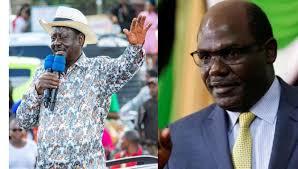Former IEBC chairman Wafula Chebukati, who passed away at Nairobi Hospital, leaves behind a legacy that continues to stir debate. His tenure as head of Kenya’s electoral body from 2017 to 2023 was marked by controversy, legal battles, and high-stakes political drama. Journalist Bernard Mwinzi, in a striking recollection, has shared details of a tense meeting with Chebukati just days before the 2022 General Election.

Mwinzi, then a journalist with the Daily Nation, had been summoned by the Independent Electoral and Boundaries Commission (IEBC) following a series of articles he had written. One particular headline, “The Making of an Opaque Election,” had raised alarms within the commission, prompting an urgent meeting at the Bomas of Kenya, the election headquarters.
A Confrontational Meeting at Bomas
Mwinzi had anticipated a private conversation with Chebukati over coffee, hoping to iron out differences regarding his reporting. Instead, he walked into a room filled with top IEBC officials, including Chebukati himself, his deputy Juliana Cherera, and CEO Marjan Hussein Marjan. From the outset, the atmosphere was hostile. Chebukati, described by Mwinzi as a man burdened by responsibility yet unnervingly detached, wasted no time expressing his displeasure.
According to Mwinzi, Chebukati accused him of attempting to undermine the election and made it clear that the commission was unhappy with his journalism. The chairman went further, warning that the commission had decided to cut advertising revenue to the Nation Media Group until they corrected their coverage. Mwinzi, in his own words, was subjected to a verbal onslaught from every commissioner present, leaving him feeling defeated.
The Shocking Declaration
After enduring the barrage, Mwinzi was finally given a chance to speak. He attempted to defend the role of journalism in holding institutions accountable, emphasizing that his reporting was not personal but aimed at ensuring transparency. But his real interest lay in understanding how the IEBC viewed the upcoming election.
It was then that Chebukati made a statement that would alter Mwinzi’s perspective on the entire electoral process.
“Raila will not win this one by the backdoor!” Chebukati declared.
When pressed to clarify what he meant by “the backdoor,” the chairman referenced ongoing court cases against the KIEMS kits and the demand for a manual voter register. He dismissed these as futile attempts to interfere with the election, stating with certainty that such efforts would not succeed.
Mwinzi, reading between the lines, realized the weight of Chebukati’s words. If the man overseeing the election had already concluded that Raila Odinga had no path to victory through legal means, the outcome seemed predetermined. Without hesitation, he contacted his newsroom and advised them to shift their focus entirely to preparing for a William Ruto presidency.
What Chebukati’s Words Meant
The 2022 General Election was one of Kenya’s most contested, with Raila Odinga and William Ruto locked in a fierce battle. Raila had raised concerns about the credibility of KIEMS kits and sought the use of a manual voter register to prevent possible manipulation. His camp viewed the electoral body with suspicion, particularly in light of divisions within the commission that later saw four commissioners—including Cherera—disown the results.
Chebukati, on the other hand, maintained that the election was conducted fairly, resisting pressure from both political sides. His unwavering stance ultimately led to Ruto’s declaration as President, a decision that was upheld by the Supreme Court despite protests from Raila’s camp.
A Legacy of Controversy
As Kenyans reflect on Chebukati’s role in shaping the country’s democratic landscape, his legacy remains a subject of intense debate. Supporters hail him as a steadfast official who withstood immense political pressure to uphold the rule of law. Critics, however, argue that his leadership lacked transparency and that his decisions tilted the political scale.
For Bernard Mwinzi, the encounter at Bomas was a defining moment. It revealed the inner workings of an institution tasked with safeguarding democracy yet marred by internal conflicts and pre-determined outcomes.
Wafula Chebukati is gone, but his actions—and the election he presided over—will be discussed for years to come.

